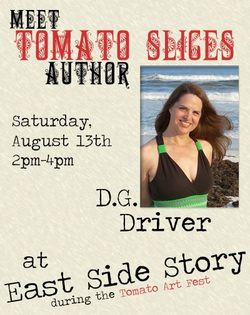 Yesterday afternoon I celebrated the release of Tomato Slices, a brand new anthology of stories, articles, poems etc. that features my fairy tale “The Tomato Quest”, in front of East Side Story bookstore in East Nashville right in the middle of their yearly Tomato Arts Festival. So, it seems an appropriate time to share some more thoughts about the craft and business of short stories. If you missed the last article that focused on the craft and business of short stories from the writer's point of view, you'll find it below this one. Today I am featuring the editor/publisher point of view on story collections. I have interviewed three people who have done these jobs on books featuring stories of mine: Kay Iscah of Amoeba Ink, publisher of Tomato Slices, Robert Krog, editor of A Tall Ship, A Star and Plunder for Dark Oak Press, and Nancy Schumacher of Melange Books (and its imprint Satin Romance Books), publisher of Second Chance for Love. Each of these people has vastly different experience with publishing and editing. Schumaker runs a publishing company with three imprints. Over the past four years, she has published 30 short story collections in addition to all of the novels her company produces. Robert Krog began editing short story collections when he approached Dark Oak Press with an idea for a pirate anthology. He now has edited several books. Kay Iscah is an indie author, and Tomato Slices is her first attempt at editing and publishing an anthology. Both the ideas for Tomato Slices and A Tall Ship… were inspired by local events. “I once had the bright idea that a publisher I knew and worked with should do an anthology of pirate stories to hawk at conventions, especially the Pirate Fair that used to take place here in Memphis,” explained Krog. Iscah told me, “Nashville is home to the Tomato Arts Fest which celebrates art themed around tomatoes. I thought it was a shame that literature wasn't one of the arts featured. I was in talks with another author about possibly publishing one of his stories. I asked if he had a tomato story. When he immediately said yes, it seemed like a sign to go forward.” 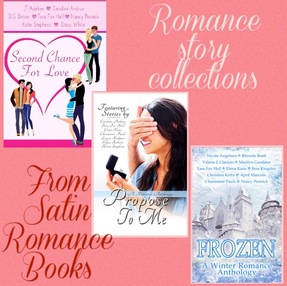 Three of the many short story collections published and edited by Nancy Schumacher. Satin Romance is an imprint of her company Melange Books. Three of the many short story collections published and edited by Nancy Schumacher. Satin Romance is an imprint of her company Melange Books. All three editors shared the ups and downs of receiving submissions. What turned them off on a short story? Nancy Schumacher: “A story that reads rushed with multiple typos on each page. Many authors rush to submit a story after a first draft when at the minimum, they should edit it at least 3 times. Also, if a story doesn’t make sense, it’s a real turn off.” Krog offers (with a touch of humor): “I discovered quickly that most of what I had been told by editors was true. Writers submitting to anthologies are often a terrible subspecies of functionally illiterate troglodytes not fit to be published. This is a bit of an exaggeration, and I have been and will again be a submitter of stories, so I know how easy it is to forget a crucial piece of guidelines. I’ve probably been the troglodyte to some else’s long-suffering editor. However, it seems that writers often don’t read the guidelines beyond a cursory glance and don’t follow them if they do. As an editor, I’ve learned that many writers need to clean up their grammar and check dictionaries more often. I feel honor bound to give stories a chance and read all submissions to the end, however onerous the process may be.” I admire that dedication. Personally, I don’t think I could read through a whole story that had numerous flaws. Iscah had close to 250 submissions to read though and found that: “Failure to follow directions was a big one. The tomato not being essential to the story or poem was another. Some of it was subjective, as any art selection is. We had two editors making selections, so if either of us gave a thumbs-down the piece was out. We rejected a lot of pieces that had the start of good ideas but lacked a certain level of polish. Since we had a fairly tight window for editing, we had to focus on pieces that were finished and did not require major editing. It's a lot easier to fix a few typos than major plot holes. “A last reason was how the stories and poems fit together,” Iscah continued. “We did want variety, but there were a few pieces that, while perfectly fine on their own, would have been jarring to the overall tone.” I can attest to that last statement. My original submission to Tomato Slices was rejected because she said (and rightly so) that it looked like I just stuck tomatoes into an already existing story. Also, she already had a story with a similar theme. Iscah liked my writing style, however, and suggested I try a fantasy story because they were light on those entries. I came up with a fairy tale for her that she later accepted. The consensus here seems to be that authors should follow guidelines closely and clean up their stories before they submit. Do not rush your submission. These concepts seem fairly obvious, and I wonder why so many authors fail to do these simple things. 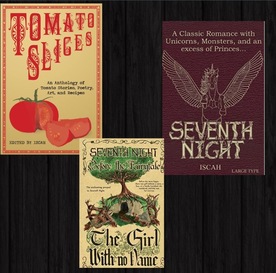 Books written and edited by Kay Iscah for her company Amoeba Ink. Learn more about her and her art. Books written and edited by Kay Iscah for her company Amoeba Ink. Learn more about her and her art. Well, if these are the turn-offs, what do the editors look for in selecting a story? Schumacher has a no-nonsense answer: “Clean manuscript – free of as many typos and errors as possible. Story premise: is it fresh, interesting, riveting, humorous? Character point of view used correctly.” Krog claims that he loves great opening lines. “Other things that catch my eye or my imagination are solid plots that don’t project their punches, philosophical insights, great characters, and really good twists on themes. Most anthologies are based on a theme these days. A writer who can take that theme and shine a new light on it yet stay true to it with a solid story is going to get published.” Iscah also commented on the importance of the theme: “We wanted to create a multi-genre anthology that reflected the eclectic nature of the festival and our own love of variety. So we were looking for inventive and significant uses of the tomato as well as overall quality, and since we had a short turnaround time, we wanted pieces that didn't need a significant amount of editing.” 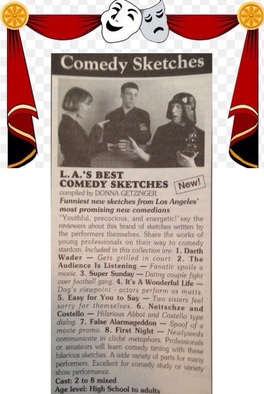 This is from the first catalog featuring this collection in 2000. It's a great collection for drama classes and camps. Still available after all these years. This is from the first catalog featuring this collection in 2000. It's a great collection for drama classes and camps. Still available after all these years. Making anthologies thematic is helpful for finding niche audiences for the books. However, all of these editors confess that short story collections aren’t as successful as novels. As an author, I know they aren’t terribly profitable. In my experience over the years, I’ve been paid a small stipend, just in contributor copies, or am splitting the royalties with the other authors. When there are 25 authors in a book, we’re talking a fraction of a cent per book sold – so not really getting paid at all. The only time I’ve edited a collection was L.A.’s Best Sketch Comedy, where I collected scenes written by fresh new Los Angeles comedians. The publisher was paying me a royalty, so I gave the authors a flat fee up front for their work. It was generous because I felt bad paying them anything less. Unfortunately, although the book is still in print and sells a few copies a year, I still haven’t earned back what I paid them. 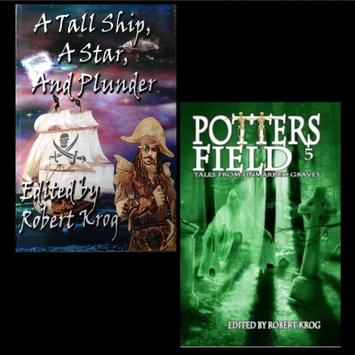 Pirates of all kinds and scary stories are what you'll find in books edited by Robert Krog. Pirates of all kinds and scary stories are what you'll find in books edited by Robert Krog. So, why publish short story collections? What’s the benefit? Nancy Schumacher answered, “It gives new authors an opportunity to be published.” For her part, “It’s exciting to ‘discover’ new, wonderful voices.” She says that the Melange Books multi-author story collections don’t sell as well as the single-author novels, but it’s a great way to get published and start building a name. Similarly, Krog wrote, “Anthologies are harder to sell. Novels are the books of choice for most readers of fiction. I suppose that could be a kind laziness on the part of readers. They like the familiar in a book, I suppose, and don’t like switching gears. A good, eye-catching cover helps, as does an unusual and interesting theme, or latching onto something currently a fad in other media such as movies.” He also point out that, “The market for anthologies is not like the market for novels. It’s a smaller market, and the tastes of the readers tend to fluctuate. The readers of anthologies are looking to read something that can be set down without guilt and picked up on a whim. Novels take commitment. It’s far worse to be disappointed by a novel than it is by a short story. The great thing about an anthology is that it has a lot of variety… if one story is bad, the next might be good, and the reader doesn’t have to feel that his money was wasted.” The idea that authors may discover your other works thanks to a short story is the idea behind a fantasy anthology to which I recently submitted. This group plans to put together a book of short stories to offer for free so our “fans” will get the book and discover all the other authors in it. I hope it works, and I hope one of my two stories submitted gets chosen. Fingers crossed. Finally, I asked the editors if they have plans for upcoming anthologies. Iscah said Amoeba Ink doesn’t have anything planned right now. Krog claims to be working on some ideas. Schumacher shared about Melange Books: We are actually seeking one more story for an anthology called Food and Romance Go Together and several stories for To Love a Scotsman. Go to this url to read the requirements.
http://www.melange-books.com/subs.html She often uses authors already published under the Melange Books umbrella, but this is a good way for new authors to break in with them. The company is brainstorming for an anthology for the Fire and Ice Young Adult Books imprint. I’m pretty excited about that prospect. I hope you’ve enjoyed this post about short stories. I have excerpts from my stories from the three anthologies featured in this article on my website. Please pop over and take a look. Second Chance for Love is currently discounted on Kindle (but not for much longer), so don’t miss that good deal. I’d love to hear from you, so please leave a comment. Comments are closed.
|
D. G. DriverAward-winning author of books for teen and tween readers. Learn more about her and her writing at www.dgdriver.com Archives
July 2024
Categories
All
|
Author D. G. Driver's
Write and Rewrite Blog
“There are no bad stories, just ones that haven’t found their right words yet.”
A blog mostly about the process of revision with occasional guest posts, book reviews, and posts related to my books.
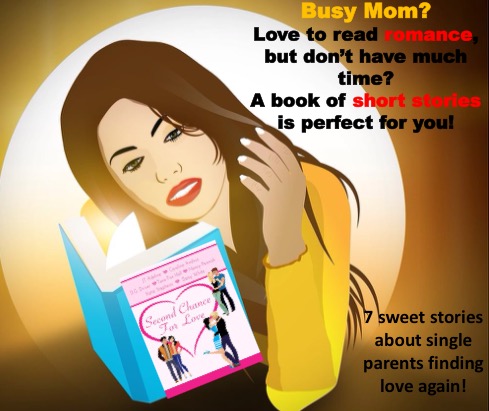

 RSS Feed
RSS Feed